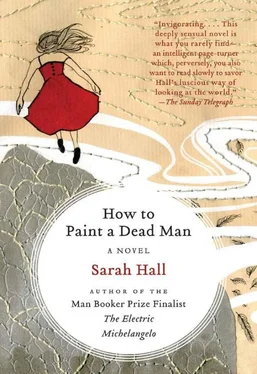Sarah Hall - How to Paint a Dead Man
Здесь есть возможность читать онлайн «Sarah Hall - How to Paint a Dead Man» весь текст электронной книги совершенно бесплатно (целиком полную версию без сокращений). В некоторых случаях можно слушать аудио, скачать через торрент в формате fb2 и присутствует краткое содержание. Год выпуска: 2009, Издательство: Harper Perennial, Жанр: Современная проза, на английском языке. Описание произведения, (предисловие) а так же отзывы посетителей доступны на портале библиотеки ЛибКат.
- Название:How to Paint a Dead Man
- Автор:
- Издательство:Harper Perennial
- Жанр:
- Год:2009
- ISBN:нет данных
- Рейтинг книги:4 / 5. Голосов: 1
-
Избранное:Добавить в избранное
- Отзывы:
-
Ваша оценка:
- 80
- 1
- 2
- 3
- 4
- 5
How to Paint a Dead Man: краткое содержание, описание и аннотация
Предлагаем к чтению аннотацию, описание, краткое содержание или предисловие (зависит от того, что написал сам автор книги «How to Paint a Dead Man»). Если вы не нашли необходимую информацию о книге — напишите в комментариях, мы постараемся отыскать её.
, Sarah Hall, "one of the most significant and exciting of Britain's young novelists" (
), delivers "a maddeningly enticing read... an amazing feat of literary engineering" (
).
How to Paint a Dead Man — читать онлайн бесплатно полную книгу (весь текст) целиком
Ниже представлен текст книги, разбитый по страницам. Система сохранения места последней прочитанной страницы, позволяет с удобством читать онлайн бесплатно книгу «How to Paint a Dead Man», без необходимости каждый раз заново искать на чём Вы остановились. Поставьте закладку, и сможете в любой момент перейти на страницу, на которой закончили чтение.
Интервал:
Закладка:
Maurizio is sitting in the driver’s seat, eating a pomegranate for breakfast. Annette climbs into the cabin next to him. He sips noisily at the slippery fruit. ‘You don’t love me,’ he says. ‘If you loved me you would have given me a rose to wear behind my ear.’ Annette smiles and tucks her chin on to her chest. Her older brother is a tease. He is always telling her she does not love him, when he knows very well she does. At the front door of Castrabecco their mother stands in her long shawl and a dark dress. She holds a crucifix between her fingers and rubs it from side to side along its chain. Under his breath Maurizio says, ‘She will start a fire with that thing one day. Then she’ll go up in flames.’
‘Is Mamma waiting for us?’ Annette asks.
‘No,’ he replies, then quite casually he says, ‘I stabbed her and left all the pieces in the bathtub. What a mess. You’re going to have to clear it up later, Netta. Then we’ll run away.’ His sister laughs, even though she knows it is a wicked thing for him to say. But Maurizio is a boy, and the rules are different. He is allowed to watch American films on Saturday night, and he is allowed to say wicked things, so long as he provides enough charm afterwards to make up for it. ‘Is Mamma waving to us?’ she asks. Maurizio turns the key in the ignition and the van shudders. ‘Yes, with her bloody stump!’
The drive to the market only takes a few minutes and the streets are clear. A tide of mist has rolled up from the lake and lingers around the steps of the old town. Maurizio leans out of the window and folds the side mirror in with a squeak and a click as they pass through the narrow citadel and into the summer theatre. He calls out to the men at the pork stand. ‘Too early! Too early, fatso!’ Already there is the smell of porchetta and charcoal burning. The other vendors are busy preparing their pitches. Annette can hear chatter and gossip, the slamming of doors and the scraping of crates. From the back of the van, Maurizio takes out the containers of flowers. He bolts together the canvas awning of the stall, tightens the screws, and then puts a wooden stool underneath it. ‘Your throne. Well, goodbye now. You will never see me again. Don’t be ashamed that you did not love me enough to make me stay.’ He puts his hands around her waist, lifts her and spins her round, six or seven times perhaps, but she loses count. The air rushes past. There is laughter close by, and she can feel her skirt billowing. When Mauri puts her down again she is unsteady on her feet. She reaches out and takes hold of the stool for support. ‘Mauri?’ He is gone. The gears grind as the old Lancia rumbles away. Elemme calls over from the thrift stall. ‘Hey. Your brother is very good-looking. He looks like Mastroianni. He’s got the chin.’
Annette arranges the bouquets so that the roses are at the front of the display. Today they are perfect. By tomorrow they will already have begun to fade. She must try hard to sell them. Her mother says the power of roses is that they make men who pass by want to propose marriage to their girlfriends. She says roses spread virtue. Annette bends down to neaten the posture of the little romantics. She is careful not to squeeze too hard, which could distress the silken petals and leave a grey mark. The roses contain a perfume that is almost too extreme for such slender creations, she thinks, as if it has been manufactured artificially and sprayed on to them. Her uncle Marcello could probably explain why, if she were to ask him. He understands aromatics. As well as growing the flowers for the stall, and the vegetables, he extracts oil from lavender and sells it to perfumeries in Parma. The soul of a flower is not its shape or its colour, but its fragrance, he often says.
Soon it is warm and the mist evaporates. A breeze comes intermittently through the market entrances, bringing with it the memory of wild herbs, lake rushes and cattle. At the café opposite chairs are scraped out from under tables and tablecloths snapped. Saucers chink as they are set down. At some stalls the haggling has already begun. The hotel kitchen boys are scouting for sweet onions to caramelise, good meat, and imported octopus to scare, once, twice, in the boiling pots, before it is submerged. Glass lids tinkle as they are raised to investigate spice; paper cracks like lightning hitting the surface of water as it is folded around ham and smoked fish. Voices crest and roll down the alleyways, there is rustling and gossiping. She can hear the tottering clogs of old women as they pass by and the narrow rasping heels of young wives. Someone is crunching a fruit rind. A loose tablecloth flutters. The summer theatre is open for business.
If Annette did not know what people looked like, if she had not ever seen them before, she would think they were fantastical compositions — part-insect, part-crockery, with wings made of gossamer or tin, with whiskers, hooves, and clicking lobster tails-so unlike tidy, soft-skinned creations do they sound. The heavy cassock of the priest brushes past like the stiff feathers of a giant bird. The tinkling of Elemme’s earrings and bangles is an exotic percussion. At home, when her mother brushes her hair into the classic chignon, the bristles sound like a licking cat’s tongue.
Often Annette wonders about Him. He is not a human. He is not made of hair and skin. But what does he look like? Does he have horns and a snout, the tusks of a boar, or the scales of a snake? Are his eyes out on stalks? Do his knees bend in reverse like a crane’s, their hinges worn shiny as old leather? And is there a sharp grey tail, like pencil lead, like the severed re-growing tails of lizards? Perhaps in his mouth is broken glass, or two rows of teeth, with which he devours his meals? But what does he eat? She tries, but she cannot remember the image she once saw, and her mother will not answer questions about the Bestia. She snatches air through her nose and leaves the room when she is asked, and Annette hears her sibilant sleeve as she crosses herself, twice, even three times. Only when the headaches come, or the moods of passion, will her mother talk about his cloak of buzzing flies and his long red shadow. The fatal shadow that was cast over Annette’s father as he died.
Annette knows he is there in the altarpiece of the church of San Lorenzo. In the painting is a vision of him that was said to have sent the illustrator mad, trying to tear his own eyes out, after its completion. ‘I have opened the gate of Hell’, he wept to the doctors. ‘I have brought something unspeakable back with me.’ How it struck fear into her when she was young, this haunted picture. In the dark varnish Christ was lifted tenderly from the cross by the faithful, and behind him was a terrible unholy face, a face that would not truly come into focus, but warped, as if pulled through water, as if the smudges of paint could never dry, as if the image were washing forever in torment. The demonic face was too terrible for her to look upon, even while she was able to look at the deep wounds of Sebastian mounted on the wall opposite, and at the intestines of the medieval martyr being wound on to a wheel by his persecutors. She knows he is still there in the church, leering at her as she kneels, and she cannot concentrate on her prayers. He is alive inside the ornate frame, alive and looking at her.
Here in the busy market, there are times she feels it too, a terrible gaze settling upon her, coming from a place at the very edge, by the furthest wall. It is as if the Bestia has stepped from behind the torrid robes and clay body of Christ and has walked from the scene of the Deposition into the street, into the summer theatre, looking for her. He stands watching, his mouth open and shining with its teeth in many rows, his inhuman eyes, and the meat of his forehead cast in primitive lumps. Then a cold wind passes, and he is gone, and the feeling is forgotten.
Читать дальшеИнтервал:
Закладка:
Похожие книги на «How to Paint a Dead Man»
Представляем Вашему вниманию похожие книги на «How to Paint a Dead Man» списком для выбора. Мы отобрали схожую по названию и смыслу литературу в надежде предоставить читателям больше вариантов отыскать новые, интересные, ещё непрочитанные произведения.
Обсуждение, отзывы о книге «How to Paint a Dead Man» и просто собственные мнения читателей. Оставьте ваши комментарии, напишите, что Вы думаете о произведении, его смысле или главных героях. Укажите что конкретно понравилось, а что нет, и почему Вы так считаете.












